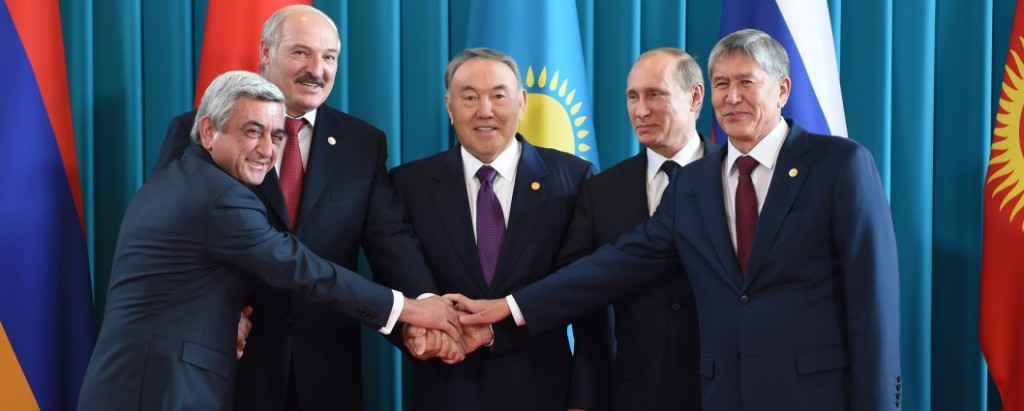BURABAI – The leaders of the Eurasian Economic Union (EAEU) met Oct. 16 at a hotel in the Kazakh resort area to discuss pressing issues facing the fledgling organisation.
Kazakh President Nursultan Nazarbayev hosted his colleagues Serzh Sargsyan of Armenia, Alexander Lukashenko of Belarus, Almazbek Atambayev of Kyrgyzstan and Vladimir Putin of Russia for discussions on further integration within the union, international issues and the strengthening of cooperation with other countries.
Following the meeting, the parties signed documents defining the economic development of the EAEU in the near future. Particularly, President Lukashenko announced that 16 issues were on the agenda and all of them were accepted at the meeting.
Participants signed two documents: “The main directions of the international activity of the EAEU for 2015-2016” and “Approaches to the development of trade and economic cooperation with key partners of the EAEU in the medium term.”
Moreover, the leaders of the EAEU adopted a package of documents regarding Kazakhstan’s accession to the World Trade Organisation (WTO) and its relation to the EAEU.
“This agreement will come into force on completion of ratification procedures in the parliaments of all EAEU member countries, which should be completed by Dec. 15, 2015,” said Viktor Khristenko, chairman of the Eurasian Economic Commission, at his briefing for journalists following the talks.
He also commented that the EAEU Board (Collegium) from Feb. 1, 2016, will be composed of 10 members (ministers), meaning two people from each of the five member countries. It was decided that the next chairman of the EAEU board will be former Prime Minister of Armenia Tigran Sargsyan.
Also, the main directions of economic policy coordination up to 2030 were accepted during the meeting, which is, according to Khristenko, “extremely important in today’s turbulence in the global economy.”
He also emphasised that the leaders of the EAEU are monitoring the situation in the world in terms of the formation of new alliances, particularly the Trans-Pacific Partnership and Transatlantic Alliance. The parties decided to closely cooperate with these two new organisations. In addition, the leaders foresee a key role for China’s Silk Road Economic Belt, which would be, according to the chairman of the EAEU Board, one of the most important areas in terms of building the external outreach of the union.
Khristenko also announced that the EUAU leaders agreed to launch free-trade agreement talks with Israel in addition to negotiations already going on with Egypt, India and Iran. Earlier, on May 29, 2015, Vietnam became the first country to sign a free trade agreement with the EAEU.
The EAEU is an economic union created by a treaty signed by Belarus, Kazakhstan and Russia in Astana on May 29, 2014. The union went into effect in January 2015. During 2015, Armenia and Kyrgyzstan joined the union. The EAEU treaty outlines four freedoms of movement of goods, services, capital and workforce.


